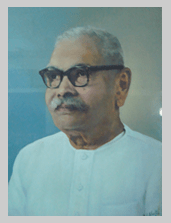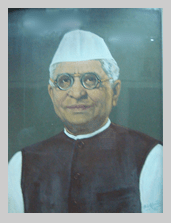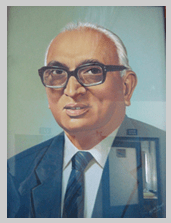Founding Fathers

One of the greatest sons of the soil, revered Shri Bhailalbhai Dyabhai Patel, fondly known as Bhaikaka, was born on 7 June 1888 at Sarsa in the Anand District of Gujarat state. A Charotari patidar by birth, and a civil engineer by training, he had braved the shock of the death of both his parents in quick succession at a very young age. He received his education in Sojitra, followed by Vadodara, and subsequently at the University of Pune from where he secured a Diploma in Civil Engineering. He began his career in engineering as a Supervisor in Mehsana, and gradually rose to become an Overseer in Dhulia in the then Bombay Province, and to become Assistant Engineer in a sub-division of Pune. 1923 saw him take up the position of an Assistant Engineer in Sukkar Barrage project in Sindh (now in Pakistan) and then worked as an Executive Engineer of the same Barrage project. Recognition of his engineering skills came in the form of the position of Executive Engineer in the Special Roads Division in Sindh.
Bhaikaka was thus at the peak of his career as an Engineer when he sought premature retirement from Government Service in 1940 at the behest of Sardar Vallabhbhai Patel, and joined Ahmedabad Municipality as Chief Engineer. This was the time when his mentor, Sardar Patel began to visualise what a soon-to-be independent India would require, and advised him to give up all this and help him in transforming Charotar into the focal point of India by serving the rural countryside so as to control migration of people from villages to towns in search of education, employment and healthcare. Bhaikaka resigned from this office too in 1942 at the behest of Sardar Patel, and was appointed as Chairman of Charotar Education Society in Anand, a few years before moving on to what we now know as the township of Vallabh Vidyanagar on 3 March 1946, but not before registering Charutar Vidya Mandal as a Charitable Education Trust on 10 August 1945. What was once a wilderness at the tri-junction of Karamsad, Bakrol and Anand thus became Vallabh Vidyanagar, and the ‘Vallabh’ was prefixed to ‘Vidyanagar’ in recognition of Sardar’s advice to work for rural uplift. Containing migration required that the reasons for migration be addressed, and Bhaikaka began to work on a plan together with Shri Bhikhabhai Patel, a dedicated and farsighted educationist, who shared Bhaikaka’s vision.
Bhaikaka believed that capital does not only consist of monetary resources but also of intellect, experience, efficiency, appropriate psychological attitude, and even work, for these brought together would constitute a resource greater than any of these elements singly. Soon, Vallabh Vidyanagar started taking shape and he began to establish one institution after another. Nine years down the line, he felt that the time has come to set up a rural university and thus came into existence Sardar Vallabhbhai Vidyapeeth (renamed as Sardar Patel University in 1968 after receiving recognition under 2f of the UGC Act) on 30 October 1955, and it was only too natural that Bhaikaka was named as its first Vice Chancellor. Interestingly, the ‘Sardar’ in the name of this university was yet another tribute to Sardar Patel. A year after completing his three-year term as Vice Chancellor, Bhaikaka resigned as Chairman of Charutar Vidya Mandal and launched into politics as the head of the Gujarat unit of the newly formed Swantantra Party. He was awarded the degree of Doctor of Science (Honoris Causa) by the university he founded at its special convocation on 12 November 1959. He was elected to the Gujarat Legislative Assembly in 1962 and as Leader of the Opposition in it. He practised value-based politics and cooperated with the Government of the day in the interest of Gujarat and the country but was scathing in his opposition to idle thinking, hasty legislation, myopic policies and corrupt practices. Bhaikaka breathed his last in Ahmedabad on 31 March 1970 after a brief illness but was cremated in Vallabh Vidyanagar as per his express wish during his lifetime.
blind texts. Separated they live in Bookmarksgrove right at the coast
 He was born on 19 June 1891 at Gambhira village of Borsad Taluka in Anand District. He was educated at Karamsad up to the year 1903, and was greatly influenced by the teachings of the then well known teacher, Shri Karuna Shankar Bhatt. He learnt from this great teacher the virtues of mastering arithmetic, being disciplined in life, and always being courteous in behaviour while dealing with others. So great was the influence of Shri Bhatt on him that he developed a warm abiding bond with this great teacher.
He was born on 19 June 1891 at Gambhira village of Borsad Taluka in Anand District. He was educated at Karamsad up to the year 1903, and was greatly influenced by the teachings of the then well known teacher, Shri Karuna Shankar Bhatt. He learnt from this great teacher the virtues of mastering arithmetic, being disciplined in life, and always being courteous in behaviour while dealing with others. So great was the influence of Shri Bhatt on him that he developed a warm abiding bond with this great teacher.
Bhikhabhai Saheb completed his BA in December 1914 and he was destined to play a larger role as a teacher. Shri Motibhai Amin established Charotar Education Society at Anand but with its headquarters in Petlad on 17 April 1916 with Shri Amabalal M Patel as Secretary. It was at the behest of Shri Ambalal Patel that Shri Bhikhabhai Patel joined as Principal of New English School, enlisted as a volunteer of Charotar Education Society, and served this society for over a period of two decades in various capacities.
He was appointed as Principal of the famed Dadabhai Navroji High School, run by Charotar Education Society, and popularly known as DN High School in Anand in 1925. He motivated successive generations of students to develop good reading habits. He was elected to the Senate of Bombay University and served on several committees appointed by it with great distinction. The influence of Shri Karuna Shankar Bhatt and his interaction with fellow educationists helped sharpen his understanding of what it means to educate future citizens of a nation that was yet to be born. He taught English and History to his students. He had played a pivotal role in the establishment of Charotar Education Society in Anand and then the Narmada Kelavani Mandal at Shuklateerth which he joined after leaving Charotar Education Society. The Quit India Movement in 1942 became a game changer in the lives of many Indians and it also affected Bhikhabhai a great deal because India was to become an independent nation five years thereafter.
Shri Bhikhabhai and Shri Bhaikaka had met at Pune in 1910, and both of them seem to have developed mutual trust in each other. Incidentally, when Shri Bhaikaka joined as Chairman of Chaotar Education Society in the first few years of the 1940s, Shri Bhikhabhai took charge of the Society as its Secretary. Their team work helped them strengthen their bond of trust and resulted in lasting friendship. Shri Bhaikaka mooted the idea of founding an educational township under the aegis of Charutar Vidya Mandal and establishment of educational institutions with the aim of ensuring rural upliftment, a cause that Shri Bhikhabhai also espoused. They decided to join hands in this noble work. The administrative skills of Shri Bhaikaka coupled with the academic skills of Shri Bhikhabhai resulted in the magic transformation of a wilderness into a habitation bubbling with educational activities.
Shri Bhikhabhai supported Shri Bhaikaka in attracting donations from people and organisations in Bombay and other cities, and lent a helping hand in the drafting of the constitution of Charutar Vidya Mandal in 1945 and later on the provisions and regulations of Sardar Vallabhbhai Vidyapith in 1955.
He departed for his eternal abode on 21 April 1956 after a brief illness of an unknown nature.
 Yet another of the greatest sons of the soil Shri Hirubhai Muljibhai Patel, affectionately called ‘HM’, was born on 27 August 1904 at Bombay. He completed his secondary education at St. Xavier’s High School in Bombay, and left for England as a 15-year old for higher studies. He passed the London Matriculation Examination in 1922, earned a BA in Economics from St Catherine’s College in Oxford, and also secured a B.Com degree as an external student at the same time from the University of London. After passing the Indian Civil Services (ICS) Examinations in 1926, he completed the mandatory training as required under service rules.
Yet another of the greatest sons of the soil Shri Hirubhai Muljibhai Patel, affectionately called ‘HM’, was born on 27 August 1904 at Bombay. He completed his secondary education at St. Xavier’s High School in Bombay, and left for England as a 15-year old for higher studies. He passed the London Matriculation Examination in 1922, earned a BA in Economics from St Catherine’s College in Oxford, and also secured a B.Com degree as an external student at the same time from the University of London. After passing the Indian Civil Services (ICS) Examinations in 1926, he completed the mandatory training as required under service rules.
Once he was back in India in October 1927, he served as Supernumerary Assistant Collector in Larkhana District in the Sindh province and met Bhaikaka. He served as Assistant Collector and then as Collector at Sukkur, Mirpur Khas, and Larkhana, and thereafter as Sindh Separation Officer in 1935. He served as Deputy Secretary in the Department of Finance in the Government of Bombay, as Trade Commissioner of India for Northern Europe in Hamburg from 1937 to 1939, and subsequently as Trade Commissioner of India for England before returning to India in 1940. He served as Deputy Secretary and Deputy Director General in the Supplies Department, then as Cabinet Secretary until October 1947, Defence Secretary from 1947 to 1953, Secretary of Food and Agriculture in 1954, Secretary of Economic Affairs thereafter, and finally as the Principal Finance Secretary.
HM’s greatest achievements as a civil servant include his distribution of assets and liabilities between India and Pakistan as Partition Secretary, besides the founding of the National Cadet Corps (NCC) as Defence Secretary. The nationalisation of the Life Insurance Corporation in 1956 owes itself to his vision. Following his retirement from Indian Civil Services, he was appointed as the Chairman of Gujarat Electricity Board by the Government of Bombay in 1958. This was the time when he also served as the Sarpanch of Vallabh Vidyanagar Gram Panchayat at the request of the local people.
He succeeded Shri Bhaikaka as the Chairman of Charutar Vidya Mandal at the latter’s invitation in 1959. He started 12 educational institutes including HM Patel Institute of English Training and Research, and introduced disciplines like Bachelor of Business Administration during his chairmanship of Charutar Vidya Mandal. Between 1959 and 1993, he was a member of the Senate and Syndicate of Sardar Vallabhbhai Vidyapith and later Sardar Patel University. He took care to guide the university to the best of his abilities along with Shri Gordhanbhai Patel of Shri Ramakrishna Seva Mandal. HM Patel Career Development Centre was established by Charutar Vidya Mandal in keeping with his wishes by way of paying this great man a tribute.
His contribution to politics was in the form of his membership of the Swatantra Party and then the Janata Party. Elected to the sixth and eighth Lok Sabha from Sabarkantha Parliamentary Constituency on a Janata Party ticket, he served as Union Finance Minister under the then Prime Minister Shri Morarji Desai in the Janata Party Government in 1977, and subsequently as the Union Home Minister under Shri Chaudhary Charan Singh for a brief period in 1979 in his short-lived government in the 8th Lok Sabha. HM was also the President of the Indian Board for Wildlife, and won the prestigious Albert Schwaltzer Medal for his work related to the conservation of natural resources and animal welfare as well as the Nargis Dutt award posthumously in 1993 for making the celebrated film “Sardar” as a tribute to Sardar Vallabhbhai Patel with whom he was associated from 1946 to 1950. He converted into reality Shri Bhaikaka’s dream of making available education, health care, and employment in one place in order to prevent migration, by working steadfastly to put the missing piece in the chain, health care, in place. He founded the Charutar Argoya Mandal and established Pramukh Swami Medical College and Shri Krishna Hospital in Karamsad.
A polyglot, he knew English, Marathi, Sindhi, Persian, Hindi, German and French, and was, like Shri Bhikhabhai Saheb, particularly fond of reading. In his numerous interactions with the students in this educational township, he would impress upon them the need to develop good reading habits and excellent communication skills in English. His publications include four introductory monographs, five books in translation, two books in English and two memorial lecture texts in Gujarati.
He bade adieu to this world on 30th November 1993 and left us with an extremely precious legacy to guard and enrich further.
